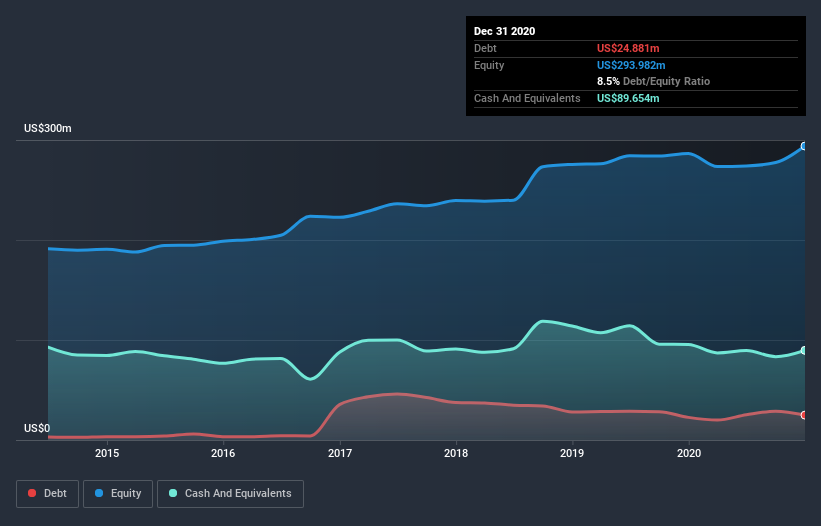These 4 Measures Indicate That Magic Software Enterprises (NASDAQ:MGIC) Is Using Debt Safely
Warren Buffett famously said, 'Volatility is far from synonymous with risk.' So it might be obvious that you need to consider debt, when you think about how risky any given stock is, because too much debt can sink a company. As with many other companies Magic Software Enterprises Ltd. (NASDAQ:MGIC) makes use of debt. But the more important question is: how much risk is that debt creating?
What Risk Does Debt Bring?
Debt and other liabilities become risky for a business when it cannot easily fulfill those obligations, either with free cash flow or by raising capital at an attractive price. Ultimately, if the company can't fulfill its legal obligations to repay debt, shareholders could walk away with nothing. However, a more frequent (but still costly) occurrence is where a company must issue shares at bargain-basement prices, permanently diluting shareholders, just to shore up its balance sheet. Having said that, the most common situation is where a company manages its debt reasonably well - and to its own advantage. When we think about a company's use of debt, we first look at cash and debt together.
View our latest analysis for Magic Software Enterprises
What Is Magic Software Enterprises's Net Debt?
As you can see below, at the end of December 2020, Magic Software Enterprises had US$24.9m of debt, up from US$22.6m a year ago. Click the image for more detail. However, it does have US$89.7m in cash offsetting this, leading to net cash of US$64.8m.
How Strong Is Magic Software Enterprises' Balance Sheet?
Zooming in on the latest balance sheet data, we can see that Magic Software Enterprises had liabilities of US$84.8m due within 12 months and liabilities of US$64.5m due beyond that. On the other hand, it had cash of US$89.7m and US$121.6m worth of receivables due within a year. So it can boast US$61.9m more liquid assets than total liabilities.
This surplus suggests that Magic Software Enterprises has a conservative balance sheet, and could probably eliminate its debt without much difficulty. Succinctly put, Magic Software Enterprises boasts net cash, so it's fair to say it does not have a heavy debt load!
Another good sign is that Magic Software Enterprises has been able to increase its EBIT by 24% in twelve months, making it easier to pay down debt. There's no doubt that we learn most about debt from the balance sheet. But it is future earnings, more than anything, that will determine Magic Software Enterprises's ability to maintain a healthy balance sheet going forward. So if you're focused on the future you can check out this free report showing analyst profit forecasts.
But our final consideration is also important, because a company cannot pay debt with paper profits; it needs cold hard cash. Magic Software Enterprises may have net cash on the balance sheet, but it is still interesting to look at how well the business converts its earnings before interest and tax (EBIT) to free cash flow, because that will influence both its need for, and its capacity to manage debt. Over the last three years, Magic Software Enterprises recorded free cash flow worth a fulsome 99% of its EBIT, which is stronger than we'd usually expect. That puts it in a very strong position to pay down debt.
Summing up
While we empathize with investors who find debt concerning, you should keep in mind that Magic Software Enterprises has net cash of US$64.8m, as well as more liquid assets than liabilities. And it impressed us with free cash flow of US$46m, being 99% of its EBIT. So we don't think Magic Software Enterprises's use of debt is risky. There's no doubt that we learn most about debt from the balance sheet. But ultimately, every company can contain risks that exist outside of the balance sheet. Case in point: We've spotted 1 warning sign for Magic Software Enterprises you should be aware of.
If you're interested in investing in businesses that can grow profits without the burden of debt, then check out this free list of growing businesses that have net cash on the balance sheet.
This article by Simply Wall St is general in nature. It does not constitute a recommendation to buy or sell any stock, and does not take account of your objectives, or your financial situation. We aim to bring you long-term focused analysis driven by fundamental data. Note that our analysis may not factor in the latest price-sensitive company announcements or qualitative material. Simply Wall St has no position in any stocks mentioned.
Have feedback on this article? Concerned about the content? Get in touch with us directly. Alternatively, email editorial-team (at) simplywallst.com.

